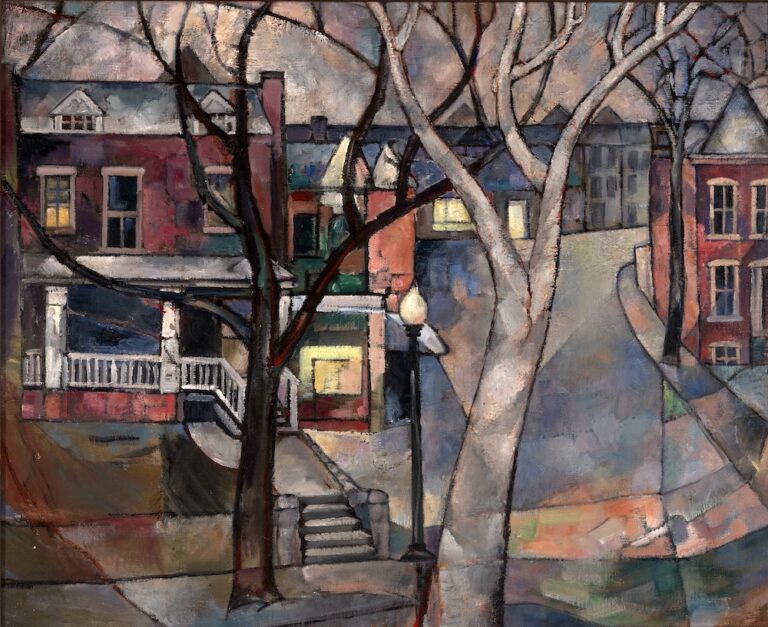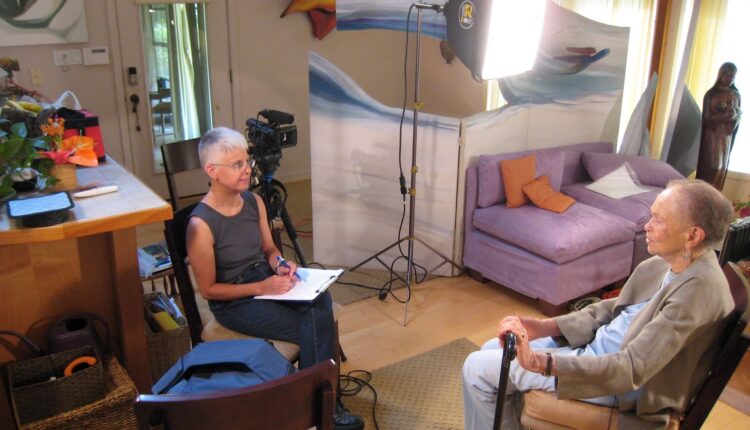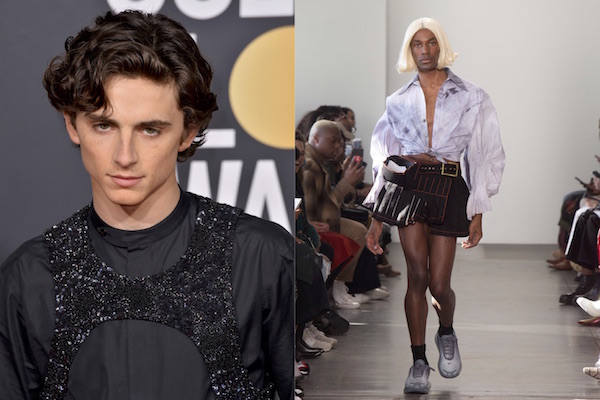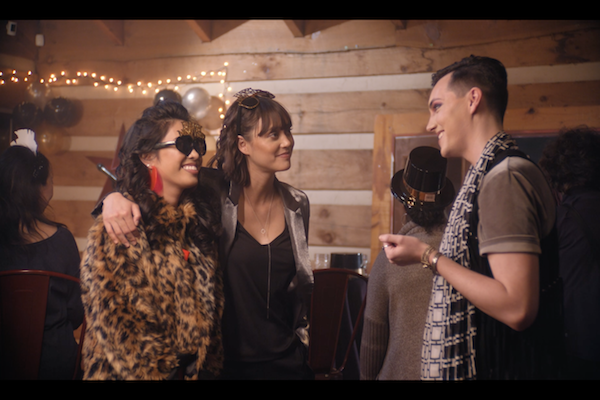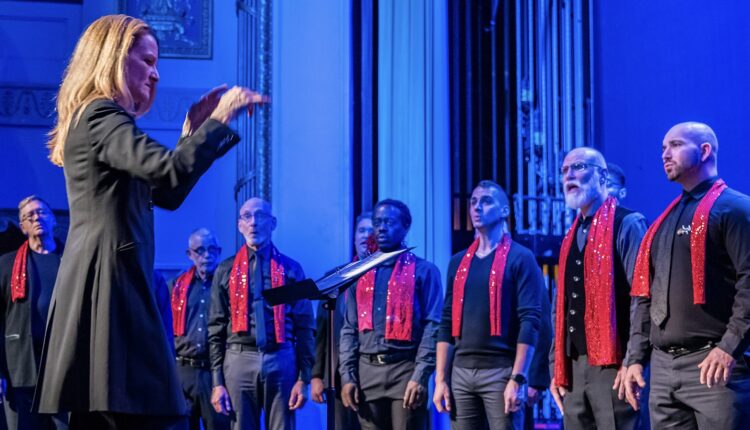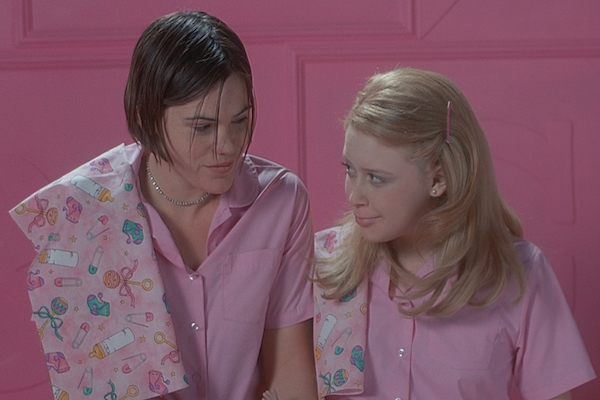By Kelly McDonnell
This article was first published December 14, 2020 in The DC Line here.
The pandemic halted live performances in March, but there’s still music and holiday cheer on tap this week.
This Tuesday at 9 p.m., WETA Arts will premiere Washington Voices: Songs of the Season, a medley of pre-recorded holiday choral performances by 12 area choirs.
The special is mainly showcasing archival footage from the choirs’ previous holiday performances since 2006. One new performance by the Children’s Chorus of Washington will also be presented, despite the difficulties of gathering and singing due to the pandemic. The group’s members individually recorded themselves singing, and the recordings were then edited together for a full ensemble performance. And while the group ceased in-person vocal rehearsals and performances in March, the members recently filmed a socially distanced American Sign Language performance in front of the Washington National Cathedral, to accompany the recorded music.
WETA Arts producer Judy Meschel and Children’s Chorus of Washington artistic director Margaret Nomura Clark collaborated to broadcast the sounds of the season even in a year where that’s technically difficult.
“Holidays are not complete without the choral concerts throughout our region,” Nomura Clark told The DC Line.
Washingtonians looking to attend a seasonal show normally have as many as seven or eight options every night throughout December, said Gretchen Kuhrmann, artistic director for Choralis, a Falls Church choir with two performances being showcased during the television event. Washington Voices will let viewers watch their favorite choirs and discover new choirs all on one night, Kuhrmann said.
The Washington area is truly the nation’s capital for choirs: for every town in the DMV, there’s one to six choirs, according to a 2003 study by Chorus America. This special includes more than 1,000 local chorus singers, the organizers said.
Kuhrmann, Nomura Clark and Thea Kano, artistic director for the Gay Men’s Chorus of Washington, DC, all said the holiday special shows that despite the pandemic’s devastation, the arts are still thriving in the region.
From the comfort of their couches, area residents can watch their neighbors performing beloved holiday music, including Christian hymns, Jewish songs, classical arrangements and pop radio classics. Kano said GMCW chose to perform the comedic “Hanukkah Rhapsody” to represent the Jewish community and to provide variety in the type of holiday music being featured.
Meschel and Nomura Clark both said they wanted the program to reflect the diverse DMV community. An independent committee from WETA Arts reviewed more than 30 submissions from local choirs and chose groups that were representative and visually interesting for the program.
The program includes children’s choirs, senior choirs, symphonic groups like Choralis, and massive ones like GMCW, which has 200 members.
In addition to GMCW, 11 choirs will be featured in the one-hour program:
- Alfred Street Baptist Church Music Ministry Choir
- The Thirteen
- Washington Performing Arts’ Men and Women of the Gospel Choir and Children of the Gospel Choir
- Alexandria Harmonizers
- Zemer Chai
- Cathedral Choral Society
- Children’s Chorus of Washington’s Bel Canto Chorus and Concert Chorus
- Choral Arts Society of Washington
- Choralis
- Encore Chorale
- Fairfax Choral Society Vocal Arts Ensemble
The different groups represent talent from throughout the DMV and “as diverse as they are… it brings us all together,” Nomura Clark said. “We are presenting ourselves to us,” Meschel added.
A special like this seemed impossible months ago. When the pandemic began, singing became one of the most dangerous activities possible, Kano said. Taking deep breaths in and releasing aerosols while vocalizing made singers both spreaders and vulnerable catchers of the novel coronavirus. Choral singing, in the traditional sense, was quickly abandoned for safety.
But Choralis’ Kuhrmann wanted to keep the choir community connected. She contacted a few local choir directors for weekly virtual meetings to discuss tips for online rehearsals and programming. The group expanded to include directors, conductors and composers across the region.
The group was a “brain dump” for sharing ideas on how to adjust to choir directing over Zoom, Kuhrmann said. “We all needed each other.”
Some groups with the same rehearsal times teamed up to host guest speakers who lectured on vocalization, music theory and composing. Nomura Clark said that one benefit of this virtual space was her ability to invite a composer from London to talk with her group.
Artistic directors began sharing arrangements that were created to accommodate the audio shortcomings of Zoom, which has presented challenges for group singing, Kuhrmann said. Zoom only highlights the single loudest sound, so when Choralis rehearses over the online platform, members have to remain muted and learn on their own, Kuhrmann said.
The Gay Men’s Chorus has had similar challenges. Kano said she doesn’t know what the entire choir sounds like until members’ individual recordings are edited together. Kano said that her group provides safety for LGBTQ+ people who are marginalized, so while virtual rehearsals may not be musically fulfilling, it still unites members with their “chosen family.”
Meschel and Nomura Clark said they hope the WETA special will encourage viewers to support local choruses and attend in-person concerts when choirs perform live again.
Kuhrmann said the artistic directors have already discussed plans for when live performances resume. Ideas include a summer festival to showcase choruses or a massive, multi-group performance at an arena where everyone can finally meet face-to-face after months of virtual bonding.
“We all have a lot of energy and passion, and none of us want to sit on our hands and go back to business as usual once this is all over,” Kuhrmann said.



